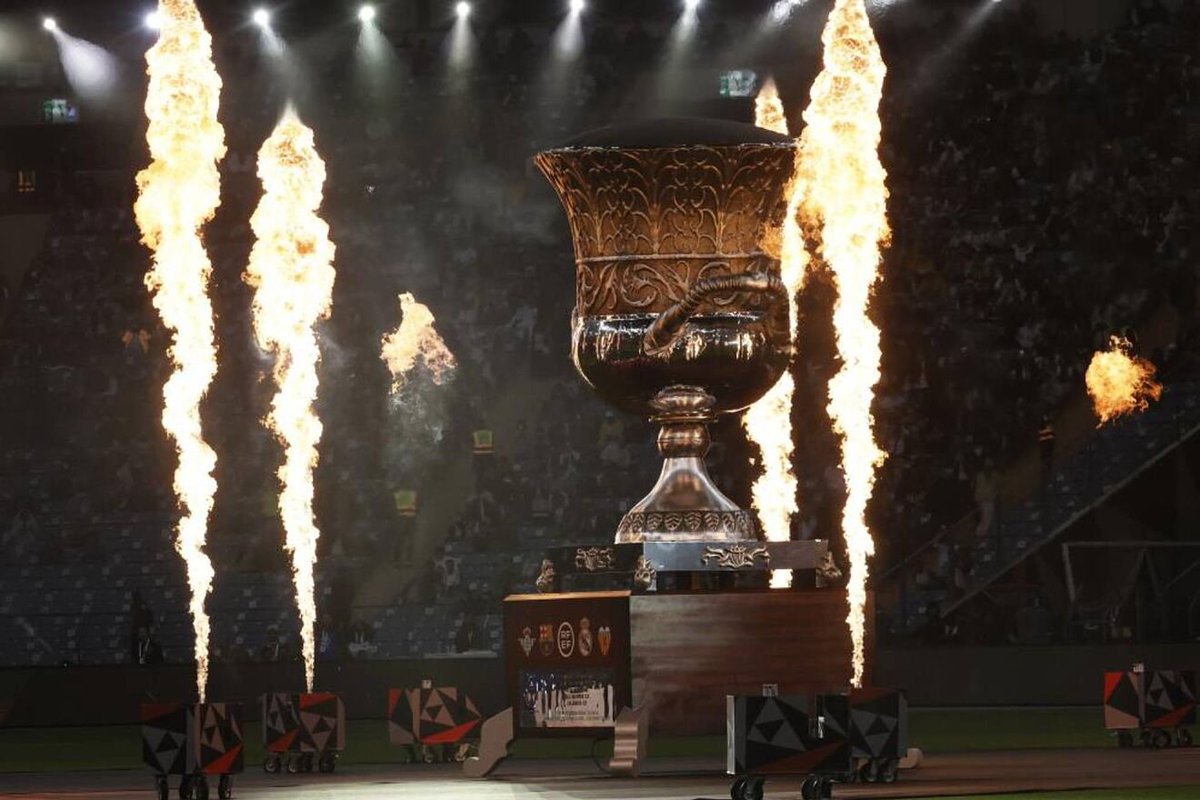F.C Barcelona – Atlético Madrid:
Revival for a first 2022 Camp Nou, Dani Alves, Adama Traoré, or how Xavi outclassed Diego Simeone to Barcelona's first major win in a while.
#JdPExplains
[THREAD]
Revival for a first 2022 Camp Nou, Dani Alves, Adama Traoré, or how Xavi outclassed Diego Simeone to Barcelona's first major win in a while.
#JdPExplains
[THREAD]

1/ Xavi's usual build-up
With now Traoré sitting wide as the lone right-winger, Xavi seeked to implement his quadruple in the center to overload the center, with now Dani Alves inverting.

With now Traoré sitting wide as the lone right-winger, Xavi seeked to implement his quadruple in the center to overload the center, with now Dani Alves inverting.


Barcelona achieved absolute numerical superiority in the first phase against Atlético 2-men pressing scheme. Instead of relying on a regular 3v2, Dani Alves & Frenkie De Jong overloaded from both sides to create a 5v2 situation – ensuring numerical advantage from the beginning. 







This is also key to understand Frenkie's superb performance yesterday, as it involved him more with Dani accompanying him: It allowed Frenkie to project himself to advance further. This ensured he remains involved without staying the deeper than any other midfielder. 

This in turn also allowed #Busquets more time on the ball, further exploiting his vision. As mentioned earlier, Adama Traoré's isolation is only a plus. Those switches of play often caught Atlético Madrid off-guard, explaining Adama's importance on and off the ball. 



Gerard Piqué was key to exploiting open spaces left empty by Atlético Madrid as he executed Eric García's role and could reach his teammates often. Frenkie pushed up high as a left-midfielder without coming too deep which allowed Barcelona to transition smoothly btl. 



The Alba-Gavi duo overwhelmed Atlético's defense out wide, w/ Gavi usually responsible for distracting Alba's usual marker, and therefore allowing the 32 year old to receive the ball in his preferred area. Barcelona had the men deeper up to pin the perfect pass out wide. 


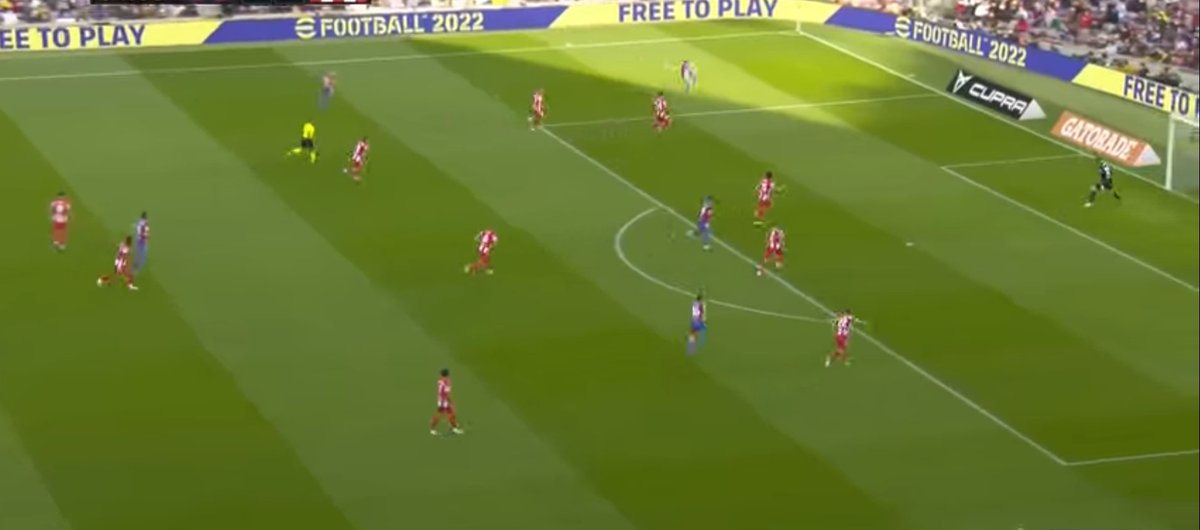
While Adama Traoré caught all the spotlight on the right, a lot of it would've become impossible had it not been for Pedri acting as a supporting interlink between the lines. Positioned himself as a passing option to ensure Adama wouldn't run in a dead end. 





Major hiccup I personally disliked, something I've often mentioned: Barcelona's man-marking pressing scheme still isn't on point: There's some milliseconds of latency that allowed Atlético to advance easier/further than they should've. A point to think about in the future. 




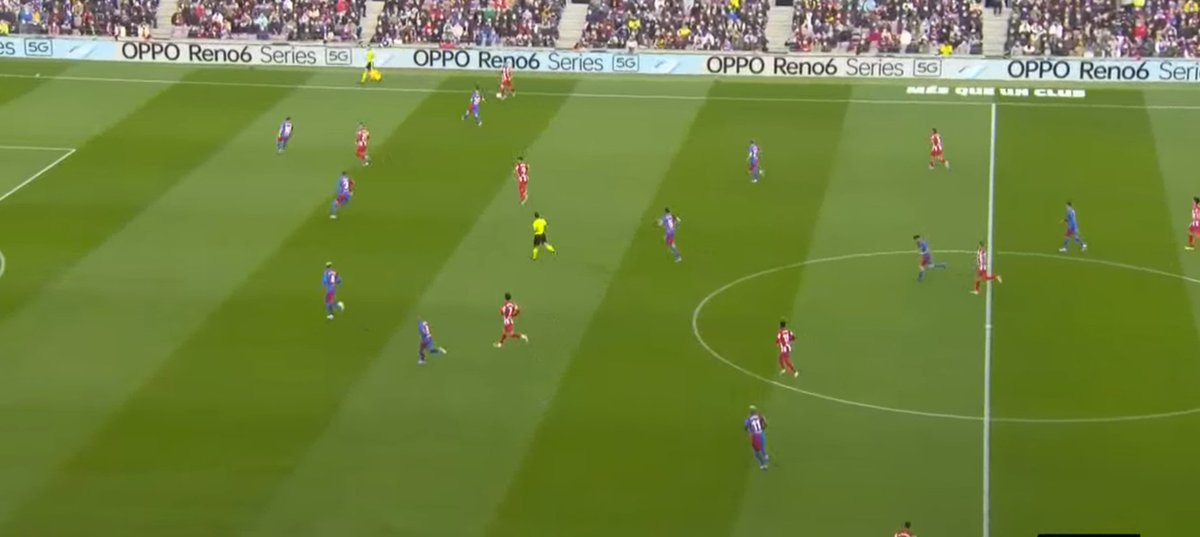


This also explains the first goal, Atlético Madrid are allowed the switch towards their right-wing as a result of Barcelona failing to press their markers earlier enough. Piqué suddenly has two runners and can't contain either, and the rest is logical. Those details matter.
There's two culprits in this situation, and that is pressing up high, but also the rigid rest defense that should alternate heights more in order to avoid this type of situation. While it was not recurrent, it certainly isn't something that should be forgotten about.
While Jordi Alba's goal is unprobable (0.03 xG!), it is true that Dani has noticed Alba's presence left alone by Atlético Madrid & the switch was a perfect timing where Barcelona had time + space. Excellent vision to do so, convinced most wouldn't have thought of it. 

Atléti's inaccuracy in the first phase of build-up allowed Barcelona's pressing scheme to work thanks to proximity between the players, which eventually resulted in dispossession high up for Atléti. Xavi's influence from Enrique couldn't be clearer. 





Unlike previous games, Busquets complemented Frenkie as he served as a transitioning option to avoid Frenkie losing his energy carrying the ball. Instead, passing it to Busquets to project himself higher up allowed him to use the same energy higher up in Atléti's camp. 
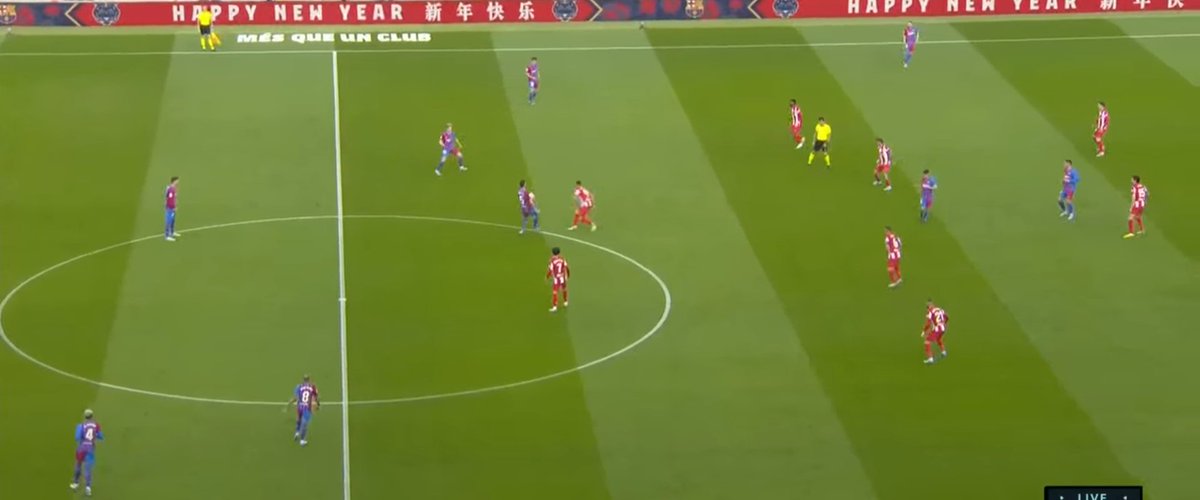
Barcelona's advantage of the left was a result of Jordi Alba having vertical option higher up (Gavi) or deeper up, in case he wouldn't be able to advance (Frenkie De Jong). This meant that eventually dispossession high up would always be covered before the half-way line. 

#Barcelona defended well against Atlético out wide, as all options within the block were shut down, and Joao Felix found himself attached by Araujo. Switching had no effect as Atlético would take a lot of time, therefore allowing Barcelona to restructure easily.
Attack = defense
Attack = defense

#Frenkie found himself involved deeper up in order to render the first phase smoother as he'd find himself passing to one of the centre-backs, usually Araujo who would find a midfielder or another man higher up the pitch. 




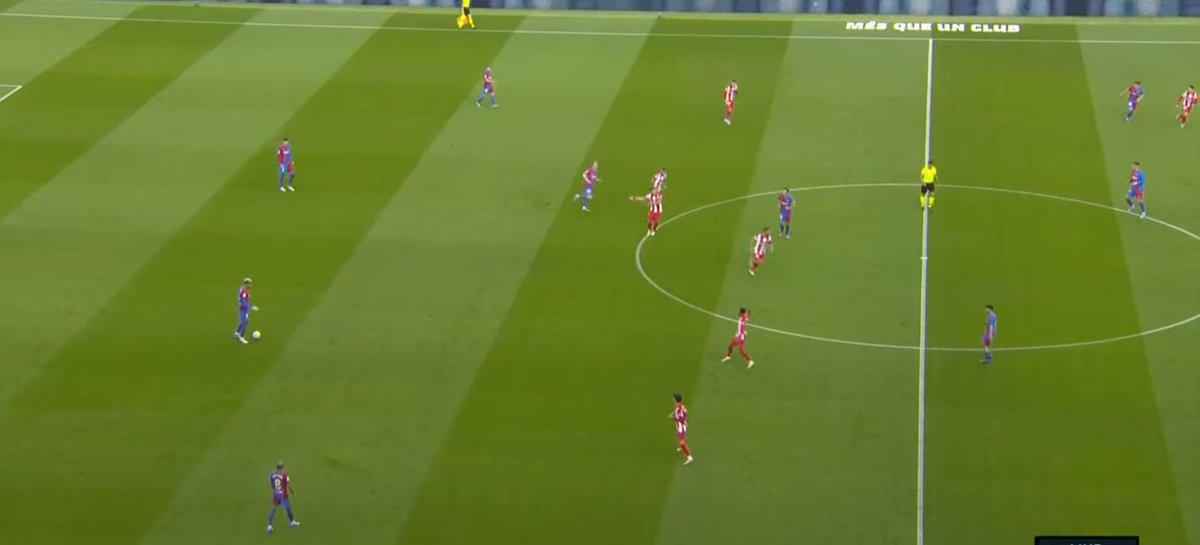

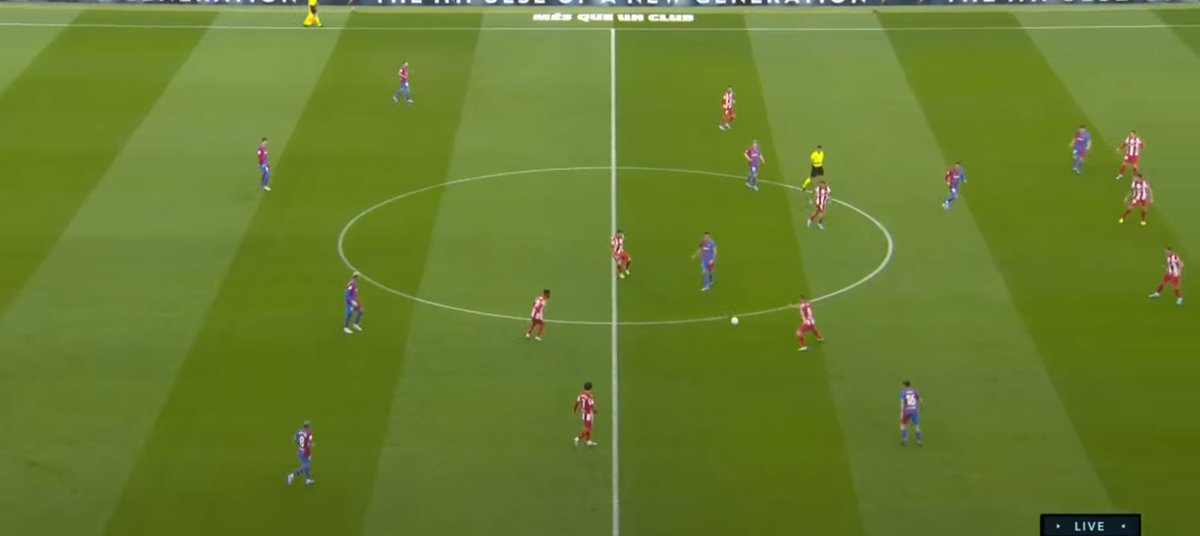
Frenkie took advantage of Atlético's lack or orgaanization to carry the ball through the vertical channel, forcing Atlético to close him down or let him pass right and left, therefore splitting lines from the first phase. Most probably one of his best games in a while. 


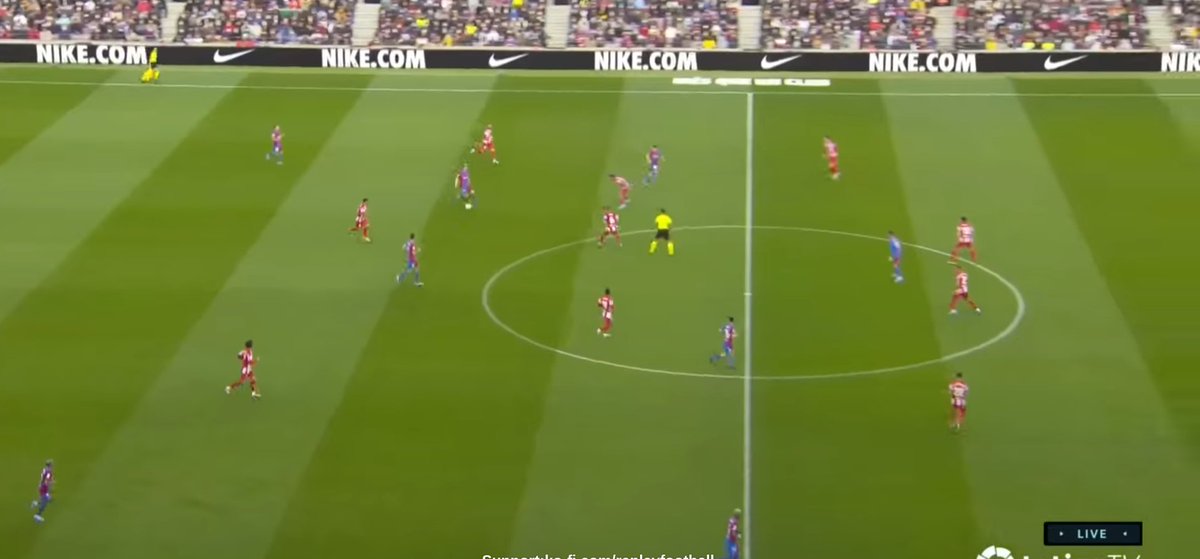
Atlético usually allowed Ferran to exist as he wasn't the most involved but when he dropped deep, Barcelona had a winning combination that proved itself very dangerous. His mobility is key, curious to see whether that pattern continues. Definitely the right usage of his profile. 



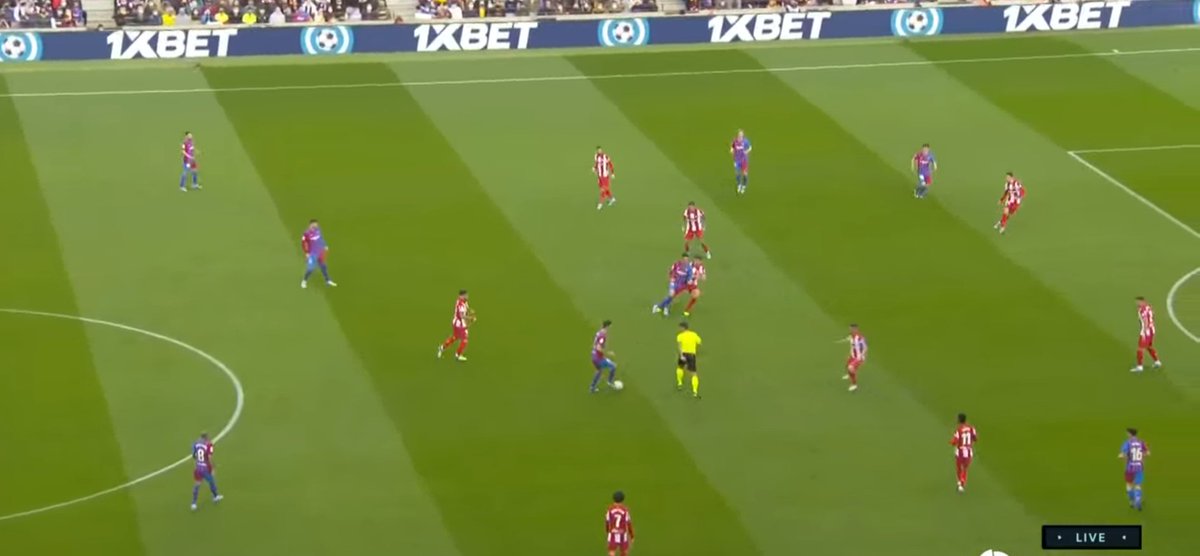

By the end of the first quarter, Adama's moves were familiar for Atlético but they never found a way to stop him. He'd constantly receive and nobody could mathc him up in the 1v1. And then, the valuable cross that was one too much for Atléti. The second goal in a nutshell. 



Barcelona's variation in transition lost Atlético too often, combining patient build-up followed by acceleration of tempo (Alba, Adama) and crucial supporting points (Pedri, Ferran). Barcelona's complementary profiles was key to achieve this hegemony. 

What's important to note is that Barcelona essentially had seen Dani as a pivot, which allowed Busquets to push up even higher, justifying his exemplary vision through his passes and pressure. FdJ + Pedri on either wing to overload centrally or wide. 

FdJ also was more efficient in his runs though he still runs at times too much & therefore exhausting himself needlessly. Nonetheless important as he was involved in all phases as he should be. Hopefully this will be a turning point in his career, the player Barcelona wanted. 

This marks the end of the thread – I hope you enjoyed it as much as I did.
[End of Thread]
[End of Thread]
• • •
Missing some Tweet in this thread? You can try to
force a refresh


